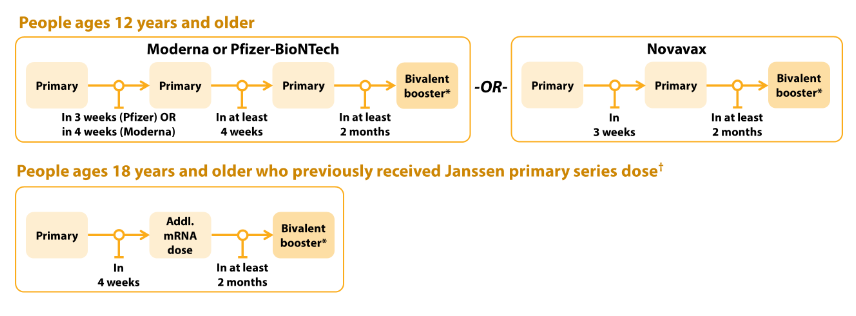On Sept. 2, 2022, the CDC approved the new COVID-19 bivalent booster vaccine. This vaccine includes mRNA from two strains of the COVID virus — the original one and the one that is currently circulating in the community (BA5). This vaccine will replace the original booster vaccine. The original vaccine will only be available for the initial vaccine series; it is no longer available as a booster.
We understand that with new information on COVID boosters, you may have questions about the latest guidance for COVID-19 prevention.
Below, we answer frequently asked questions for transplant patients about COVID-19 vaccines, boosters and Evusheld. You also can learn more about COVID-19 prevention and treatment and read Penn Medicine’s COVID vaccine FAQs.
COVID-19 Booster FAQs for Transplant Patients
Should transplant patients get a new bivalent COVID-19 booster?
Yes, we recommend that everyone, including transplant candidates, recipients and living organ donors should get a bivalent COVID-19 booster. COVID-19 is still present in the United States and worldwide. COVID vaccines and boosters provide the best protection against infection, severe sickness, hospitalization, ICU care and death from COVID-19.
How do I know which vaccine to get for my booster?
The original Pfizer, Moderna, Johnson & Johnson, and Novavax vaccines are recommended for patients who have never been vaccinated. Once you have received your original vaccine series, you should get the new bivalent booster vaccine (Pfizer or Moderna) for your booster. The original vaccines are no longer authorized for booster vaccines for adults and will no longer be available for this indication. Children less than 12 should still get the original vaccine as the booster. Children aged 12 to 17 years should get the updated Pfizer bivalent booster.
When can transplant patients, transplant candidates or organ donors get a bivalent booster vaccine?
For immunosuppressed patients, including transplant patients and people who are on immunosuppression for other reasons, boosters are recommended two months after your last dose of COVID vaccine or 3 months after COVID infection (whichever occurred most recently). The chart below shows the timing of vaccination for transplant recipients and others on immunosuppression.
For living donors and candidates not on immunosuppression, the bivalent booster is available two months after completion of the two dose primary vaccine series (see the 3rd chart).

If I have gotten Evusheld, can I get the new COVID booster? Which should I get first?
Evusheld can be given at any time after transplant and we recommend that patients who have been vaccinated pre-transplant get Evusheld during their admission for transplant. If you are at least one month after transplant and have not gotten your booster or Evusheld, we recommend that you get your booster first and then get Evusheld two weeks later. If you have already gotten Evusheld, you can get your COVID booster at any time after you received Evusheld, as long as it has been two months since your last vaccine dose or COVID infection. We often wait a few weeks after Evusheld to give the booster. The chart below shows the timing for Evusheld and vaccine:

Will the new bivalent COVID booster have different side effects than my previous vaccines?
Reactions to the new bivalent booster are expected to be similar to the original vaccine. In some cases, people report sore arms, fevers, fatigues, and flulike symptoms. These symptoms are short-lived and typically last for a couple of days or less.
Where can I get the new booster?
At this time, many pharmacies already have the new COVID booster. We expect Penn Medicine practices to get the booster in the near future. Please let your transplant team know when you have received the booster so we can make sure your chart is up to date. If you have any questions regarding your booster, please contact us.
Can transplant patients get a flu shot and bivalent COVID booster at the same time?
Yes, these vaccines can be given at the same time, preferably in different arms.